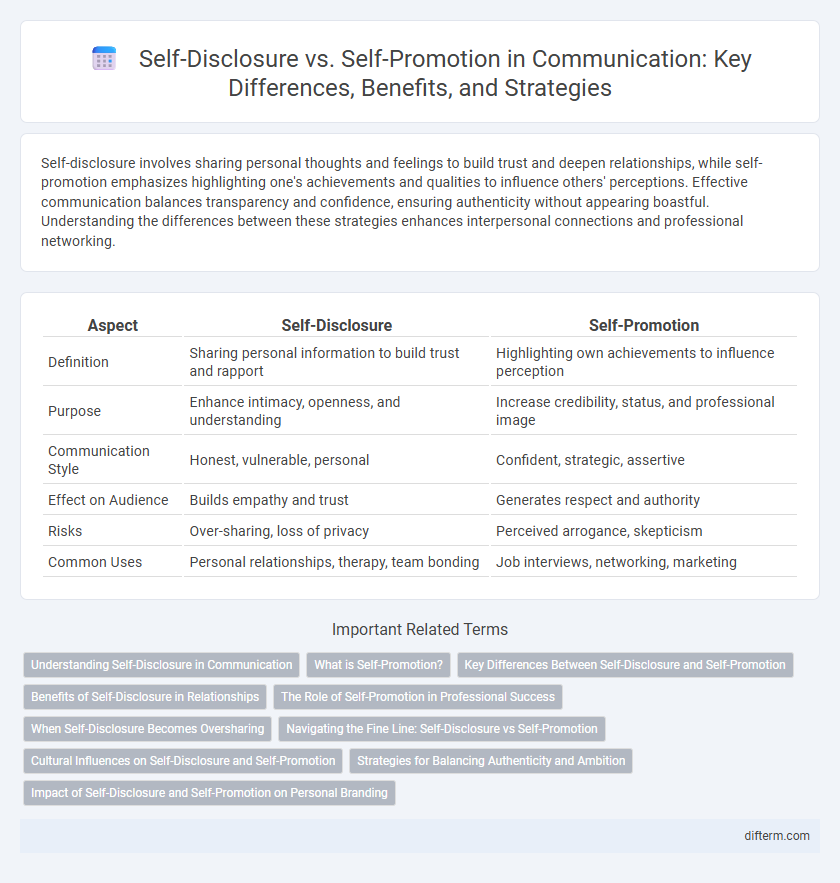Self-disclosure involves sharing personal thoughts and feelings to build trust and deepen relationships, while self-promotion emphasizes highlighting one's achievements and qualities to influence others' perceptions. Effective communication balances transparency and confidence, ensuring authenticity without appearing boastful. Understanding the differences between these strategies enhances interpersonal connections and professional networking.
Table of Comparison
| Aspect | Self-Disclosure | Self-Promotion |
|---|---|---|
| Definition | Sharing personal information to build trust and rapport | Highlighting own achievements to influence perception |
| Purpose | Enhance intimacy, openness, and understanding | Increase credibility, status, and professional image |
| Communication Style | Honest, vulnerable, personal | Confident, strategic, assertive |
| Effect on Audience | Builds empathy and trust | Generates respect and authority |
| Risks | Over-sharing, loss of privacy | Perceived arrogance, skepticism |
| Common Uses | Personal relationships, therapy, team bonding | Job interviews, networking, marketing |
Understanding Self-Disclosure in Communication
Understanding self-disclosure in communication involves recognizing the intentional sharing of personal information to build trust and deepen relationships. Unlike self-promotion, which aims to highlight achievements or competencies, self-disclosure fosters emotional connection and authenticity by revealing thoughts, feelings, and experiences. Effective self-disclosure enhances interpersonal communication by encouraging openness and mutual understanding.
What is Self-Promotion?
Self-promotion is the strategic communication tactic where individuals highlight their skills, achievements, and qualities to create a favorable impression. This approach aims to enhance personal brand visibility and establish credibility in professional or social settings. Effective self-promotion balances confidence with authenticity to foster trust and influence.
Key Differences Between Self-Disclosure and Self-Promotion
Self-disclosure involves sharing personal thoughts and feelings to build trust and intimacy in communication, whereas self-promotion focuses on highlighting one's achievements and skills to influence others' perceptions. Self-disclosure fosters authenticity and emotional connection, while self-promotion targets impression management and social status enhancement. The key differences lie in intent, content, and the relationship outcomes each strategy aims to achieve.
Benefits of Self-Disclosure in Relationships
Self-disclosure fosters trust and emotional intimacy by allowing individuals to share personal thoughts and feelings openly, which enhances relationship satisfaction. This transparent communication encourages mutual understanding and empathy, strengthening relational bonds over time. Unlike self-promotion, which centers on portraying oneself favorably, self-disclosure creates authentic connections that promote long-term relational stability.
The Role of Self-Promotion in Professional Success
Self-promotion plays a critical role in professional success by strategically highlighting one's skills, achievements, and value within the workplace, thereby enhancing visibility to key decision-makers. Unlike self-disclosure, which centers on sharing personal thoughts and feelings, self-promotion serves as a deliberate communication tactic designed to influence career advancement and networking opportunities. Effective self-promotion fosters recognition, builds credibility, and opens doors to leadership roles and professional growth.
When Self-Disclosure Becomes Oversharing
Self-disclosure enhances trust and rapport in communication but becomes oversharing when personal information overwhelms or discomforts the listener, potentially damaging relationships. Effective communication requires balancing transparency with boundaries, ensuring that sharing remains relevant and appropriate to the context. Research shows that excessive self-disclosure can trigger negative perceptions, reducing credibility and professional appeal in social and workplace interactions.
Navigating the Fine Line: Self-Disclosure vs Self-Promotion
Navigating the fine line between self-disclosure and self-promotion involves balancing authenticity with strategic communication, ensuring that personal information fosters trust without appearing boastful. Effective self-disclosure strengthens relationships by sharing genuine experiences, while self-promotion highlights achievements in a way that adds value to the audience. Mastering this balance enhances credibility and engagement in both personal and professional contexts.
Cultural Influences on Self-Disclosure and Self-Promotion
Cultural differences significantly shape patterns of self-disclosure and self-promotion, with collectivist societies often emphasizing group harmony and privacy, leading to restrained self-disclosure but subtle self-promotion through group achievements. In contrast, individualistic cultures encourage open self-disclosure and explicit self-promotion as expressions of personal identity and success. Understanding these cultural nuances is essential for effective communication across diverse social contexts, as they influence relational dynamics and perceptions of authenticity.
Strategies for Balancing Authenticity and Ambition
Balancing authenticity and ambition in communication involves strategically combining genuine self-disclosure with mindful self-promotion. Effective communicators share personal insights to build trust while selectively highlighting achievements to demonstrate competence and drive. This approach ensures credibility is maintained while advancing professional goals within social and workplace interactions.
Impact of Self-Disclosure and Self-Promotion on Personal Branding
Self-disclosure enhances personal branding by building trust and authenticity, allowing others to connect with genuine experiences and values. Self-promotion amplifies visibility and credibility by showcasing achievements and skills, positioning individuals as experts in their field. Balancing both strategies creates a compelling personal brand that resonates emotionally while demonstrating competence and credibility.
self-disclosure vs self-promotion Infographic

 difterm.com
difterm.com